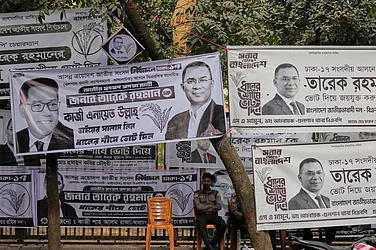Over a week since news of a family of four from a Gujarati village freezing to death in the Canada-US border shocked the nation, the victims have been identified. The family of four, residents of Dingucha village in Gandhinagar's Kalol tehsil were allegedly trying to illegally enter the United States through the Canada border when they froze to death in Manitoba province of Canada on January 19.
Who were the victims?
The victims have been identified as husband and wife Jagdish and Vaishali Patel, in their late thirties, and their two children. Daughter Vihangi was 11-year-old while the youngest son Dharmik was just three-year-old. The identities of the victims were confirmed by the Indian High Commission in Ottawa, Indian Express reported.
The victims belong to Dingucha, a village that is fast urbanising into a small town just 40 km from Ahmedabad. According to reports, many from the Dingucha were settled outside in countries like the US, Canada, Australia. Local residents of the town claim that these people have made generous contributions toward the construction of several amenities in the village including schools, markets, temples and even the panchayat building, PTI reported. The town is also full of posters and advertisements about study courses and job opportunities abroad.
Jagdish had been living in Kalol, a nearby town from Dingucha along with his family in a one-storey house. He had returned to the village when the lockdown hit but went back to Kalol after the lockdown was lifted. He had worked several jobs including helping his father with farming and working as a schoolteacher. His family had gone to Canda a fortnight ago and had been missing since.

How did the family freeze?
According to reports, the family of four had been trying to enter the US illegally through the US-Canada border when the incident occurred. The family had apparently been part of a larger group of Indian immigrants - all illegally entering the US - but had been separated from the group and travelling on foot while waiting to be picked up by someone. On the night of January 19, The US Border Patrol intercepted a 15-seater van driven by a Florida resident in which two of the passengers were undocumented Indians. A little further from the van, authorities found a group of five Indian nationals in Minnesota who claimed they had been walking for 11 km in the blizzard. The bodies of the Indians were recovered further inside Manitoba on the Canadian side of the border. Three bodies of the husband, wife and daughter were found frozen together while the infant son was found a little way further. According to reports, temperatures had dropped to minus 35 degrees C on the night of the incident. While the victims were reportedly dressed in warm clothes, they were no match to the harsh winter that the US is facing this year. As per reports, two of the seven Indian nationals landed up in the hospital. All seven are now facing deportation charges in US, the Associated Press reported.
Why was the family trying to illegally enter?
As per reports, many from small towns and villages like Dingucha do not apply for VISAs or follow the legal route when entering countries like the US or Canada. All one needs is good networking and connections within the Indian diaspora settled abroad. The deceased Jagdish had told his cousin that he had obtained a visitor's visa and was going to Canada with his family. The family left without intimating anyone. The case is being investigated by Gujarat CID who have got in touch with the Indian Immigration Department in the US to probe the matter. Authorities are trying to find out if the family - which had been part of a group of 12 Gujaratis trying to illegally enter the US, had any external help. In the US, authorities arrested Steve Shand, the Florida resident who had been found driving the van with two undocumented Indians. However, he has since been released without bond.

Why is the incident significant?
The incident sheds light on the illegal immigration of Indians into the US from the northern Canada border during the winter months, a time when the US traditionally focuses on its Southern border with Mexico. Referring to the incident as a "heartbreaking tragedy", a Canadian official was quoted by the media as saying that the family not only faced freezing temperatures and cold gusts of wind but endless tough terrain darkness. While thousands of illegal immigrants from Punjab, Haryana and Gujarat are known to attempt entering the US from the heavily guarded southern border in Mexico, Us media has been increasingly reporting on incursions from the northern Canadian border, which is not only less guarded but also offers dangerous and unusual terrain to those attempting to cross it.
The incident also sheds light on the flourishing human trafficking and smuggling industry in India which feeds on poor or uninformed people's dreams to settle in the US to pursue the 'American dream'. According to a report by TOI, the agent that had been responsible for sending Jagdish's family to Canada (and then, presumably to the US), charged Rs 75 lakh for an adult and Rs 25 lakh for a minor. According to locals, the agent has sent 10 such families to Canada in the past few years. Three of those families remain missing till this day.


























